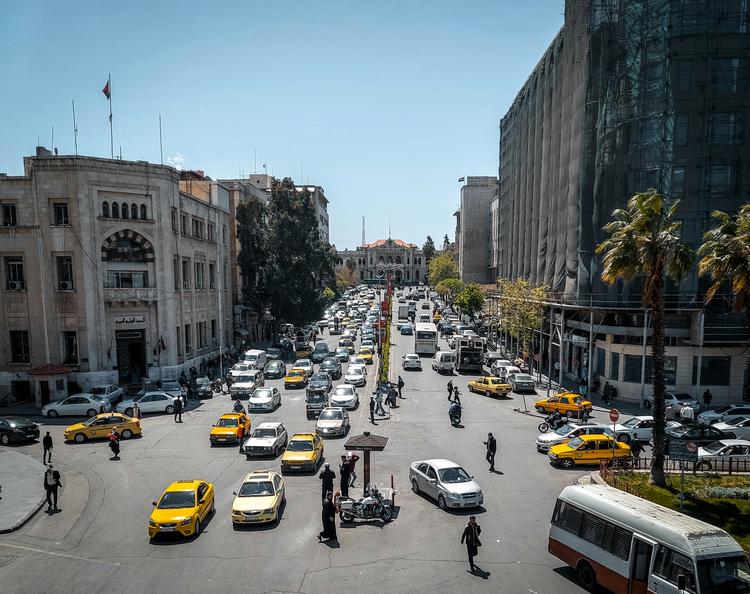( Aljumhuriya ) – Even as a ceasefire has, for now, calmed tensions between Israel and Iran, Trump’s decision to officially join Israel’s war effort has been illuminating on a multitude of fronts. In particular, it revealed how quickly Iran was able to cultivate global support for its sovereignty and multiple calls for restraint, particularly in the Muslim-majority world.
Even putative rivals of the Islamic Republic, like Saudi Arabia, have temporarily cast aside their tensions with Iran, and have (at least publicly) condemned the US-led attacks on Iranian sovereignty, calling instead for de-escalation. With one exception, that is: much of the Syrian public has been outright ambivalent about Iran’s latest woes.
Interim Syrian president Ahmad al-Sharaa has been conspicuously silent about the broader conflict between Israel and Iran, even before America formally intervened. This is perhaps understandable, given that his state was demilitarized overnight by Israel immediately after the fall of the Assad regime in December. Being unable at present to protect Syrian sovereignty from increasing Israeli incursions, the transitional Syrian government is in no position to flex diplomatic muscle against its neighbor’s turf wars with Iran.
But the position of the transitional government aside, a flood of Syrian commentators on social media have been demonstrably not on Iran’s side in light of these latest aggressions.
Many are on the fence, while some have gone as far as to cheer Iran getting a bloody nose. As one commentator put it, Iran is now getting its just comeuppance for its destruction of Syria.
To be clear, Syrian ire at the Islamic Republic of Iran is wholly legitimate and warranted. Iran played a devastating role in providing military and economic support to the Assad regime. Deliberately weaponizing the Shia sect of Islam, Iran sent foreign Shia fighters from all over the world as cannon fodder for the Assad regime. This policy included the neighboring Lebanese Shia armed group Hezbollah, but also included fighters from venues such as Afghanistan and Pakistan, which have no palpable stake in Syrian affairs.
These Shia militias did not merely offer military support: they engaged in sectarian reengineering, deliberately undermining Syria’s pluralistic religious landscape. The Syrian Sunni town of Al-Qusayr is a case in point; following its ethnic cleansing by Hezbollah forces, the town was repopulated with foreign (primarily Iranian) Shia, exacerbating hitherto nonexistent sectarian tensions.
It is unsurprising, then, that while the Israeli assassination of Hassan Nasrallah last year was met with anger and sorrow by much of the region, Syrians in Idlib cheered his passing.
Syrians are thus entirely in the right to remember the Islamic Republic’s perfidy. With the fall of the Assad regime, a new Syria would be wise to demand accountability from Iran for its crimes. But Syrians celebrating US and Israel-led attacks on Iran are being short-sighted.
As a nascent state in political transition, a free Syria would be the biggest beneficiary of regional stability. Visceral volatility from regional warfare, on the other hand, could quickly undermine Syria’s brief experiment with democratic governance: even if that volatility gives a black eye to a loathed adversary, the long-term prospects of regional war are disastrous for Syria.
Nader Hashemi, an Iran expert at Georgetown University, puts it in starker terms. “The people of Syria have suffered the most from the regional intervention of the Islamic Republic of Iran,” he says. “But anyone who cheers on the Trump-Netanyahu war machine against Iran must recognize that Syria could just as easily be next.”

Photo of Damascus in 2024 by Mahmoud Sulaiman on Unsplash
The pace at which Israel has gobbled up Syrian territory suggests this may be the case. Immediately following the fall of the Assad regime in December, Israel exploited the power vacuum of Assad’s ouster to invade the buffer zone in southwest Syria, increasing its territorial hold by several hundred square miles. In the months that followed, Israel furthered those incursions, both with ground offensives and with air strikes – some of which have successfully reached the capital of Damascus.
And in light of the latest Israeli offensive in Iran, Israeli forces have penetrated deeper into Syrian territory, advancing several kilometers into Quneitra province. Increased US-Israeli militarism in Iran, then, is no protection for preserving Syria’s own sovereignty.
Indeed, Syrian cheerleaders for Trump’s campaign against Iran should be careful what they wish for.
Reprinted from Aljumhuriya with the permission of the author.


 © 2026 All Rights Reserved
© 2026 All Rights Reserved